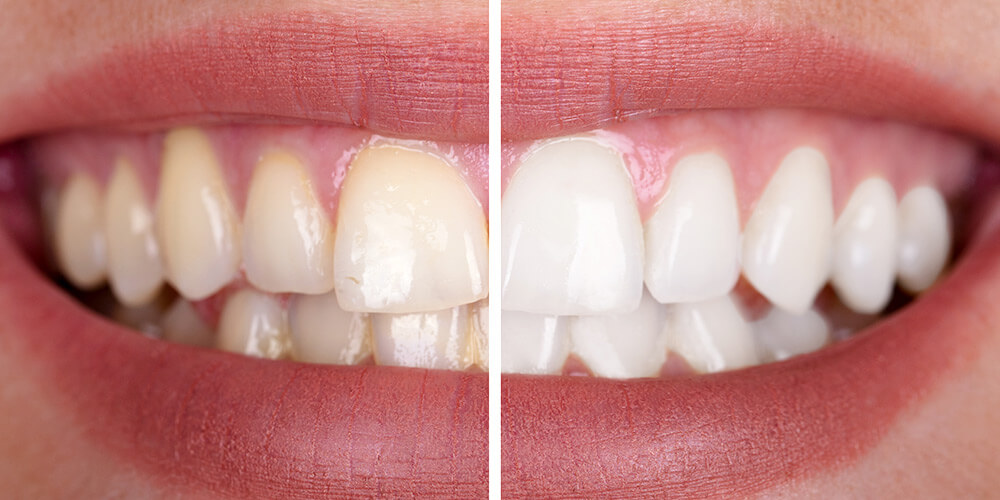Pain-sensitive teeth – dentine hypersensitivity
Many people suffer from pain-sensitive teeth. The consumption of cold or hot food and drinks results in an intense, stabbing pain in the teeth of those affected. Sweet, acidic and salty foodstuffs or even a cold breeze can cause this unpleasant feeling. Sensitive teeth are often caused by exposed tooth necks or damage to the dental enamel.
Read on to learn how sensitivity to pain develops in teeth and what factors favour its development. This article also provides information on what treatment options the dentist can offer, what you can do to treat sensitive teeth and how the active ingredient BioHAP helps to reduce sensitivity to pain.
Dentine hypersensitivity – the cause of pain-sensitive teeth
Pain results when the dentine is exposed. One reason for this may be that the enamel that protects the teeth becomes thinner over time or that the gums recedes (gingival recession) and the dentin becomes visible. Microscopically small channels (so-called tubules) run through the dentine and connect to the tooth nerve.
Should these dentinal tubules be exposed due to gum recession or loss of enamel, external stimuli can reach the dental nervedirectly. As a result, the teeth react more sensitively to cold, heat and acid. In medical terminology, these symptoms are referred to as dentine hypersensitivity.
Causes of pain-sensitive teeth
Teeth react sensitively to external stimuli if the enamel is damaged or if the tooth necks are exposed. The enamel is the hard outer layer of the tooth and protects the dentine. The gums also have a protective function. Should the gums recede, the tooth necks become exposed. Some of the more common reasons for damage to the enamel and gums are:
- Tooth erosion: When the enamel, i.e., the hard outer layer of the tooth, is removed, this is referred to as tooth erosion. This happens when acids attack the enamel and the dentine is exposed. On the one hand, acidic foods and drinks, such as lemonade, are particularly harmful to tooth enamel. Gastric acid can also cause serious damage to tooth enamel, e.g., from severe vomiting, oesophagitis such as reflux oesophagitis and bulimia. Mouth dryness can further encourage tooth erosion. The reduced production of saliva means that any acids consumed are not neutralised as effectively.
- Tooth grinding: Grinding of the teeth (bruxism) involves the chewing surfaces being rubbed together, usually unconsciously and often during sleep. This can cause the enamel to be worn away and the dentine becomes exposed.
- Incorrect tooth brushing:Brushing your teeth too often or using the wrong brushing technique can damage the tooth enamel or literally brush away the gums. If you apply too much pressure with the toothbrush, use the wrong bristle hardness or a very abrasive toothpaste, you risk losing tooth enamel and gums.
- Inflammation of the gums: Inflammation of the gums, such as periodontitis, can cause the gums to recede. This results in exposed tooth necks and thus exposed dentine.
- Tooth fracture: A chipped or broken tooth can expose the dentine and thus be particularly sensitive to external stimuli. If the tooth is treated and the fracture is filled, the symptoms will normally disappear.
- Dental interventions: The teeth can become sensitive after some dental treatments such as professional bleaching (tooth whitening), professional tooth cleaning, the insertion of braces or fillings. However, this sensitivity subsides quickly after the end of treatment.
Treatment of pain-sensitive teeth: What the dentist can do
First you need to establish the cause of the pain, your dentist will help you with this. If exposed dentine is the cause of the sensitivity, various measures can be considered to alleviate the pain.
- The dentist can occlude the dentine and the exposed dentinal tubules with liquid plastics. The dentinal occlusion closes the small channels to the tooth nerve and reduces sensitivity to pain.
- In severe cases of periodontitis, where the gums are already far receded and the tooth necks are darkly discoloured, the dentist can also opt for a surgical intervention. Here the gum is moved back to its original position. The necks of the teeth are thus again protected by the gums and any sensitivity to pain is reduced.
Prevent pain-sensitive teeth: What you can do
Good dental care habits and proper oral hygiene are key to preventing gum recession and pain-sensitive teeth:
- Ask your dentist to show you a gentle tooth brushing technique. As a general rule, you should not apply too much pressure when brushing your teeth and you should work "from red to white", i.e., from the gum to the tooth.
- Use a toothbrush with soft or medium-hard bristles in order to prevent gum recession.
- Special toothpastes and tooth gels for sensitive teeth can help seal the dentinal tubules by adding calcium, arginine or synthetic hydroxyapatite. According to recent studies toothpastes with BioHAP are very well suited to reducing tooth sensitivity.
- You should also use floss and mouthwash as these help to reduce the risk of pain-sensitive teeth.
- Clean the entire oral cavity including the interdental spaces and areas along the gum line.
- Avoid acidic food and drink
- Before going to bed you can also use a toothpaste designed for sensitive teeth on the exposedroot cementum or dentine to ease the sensitivity. Using the tip of your finger or a Q-tip, massage the toothpaste directly onto the exposed area.
This may also be of interest to you

Inflammation of the gums: Gingivitis or periodontitis?
More than 50% of adults suffer from gum problems. Find out more about what can help.

Tooth discolouration and tooth whitening
Tooth discolouration is essentially a cosmetic issue. Discover what methods are available to get your teeth looking white again.

Caries: How to protect your teeth
Caries is one of the most common diseases in the world. Find out more about the caries and its causes.




